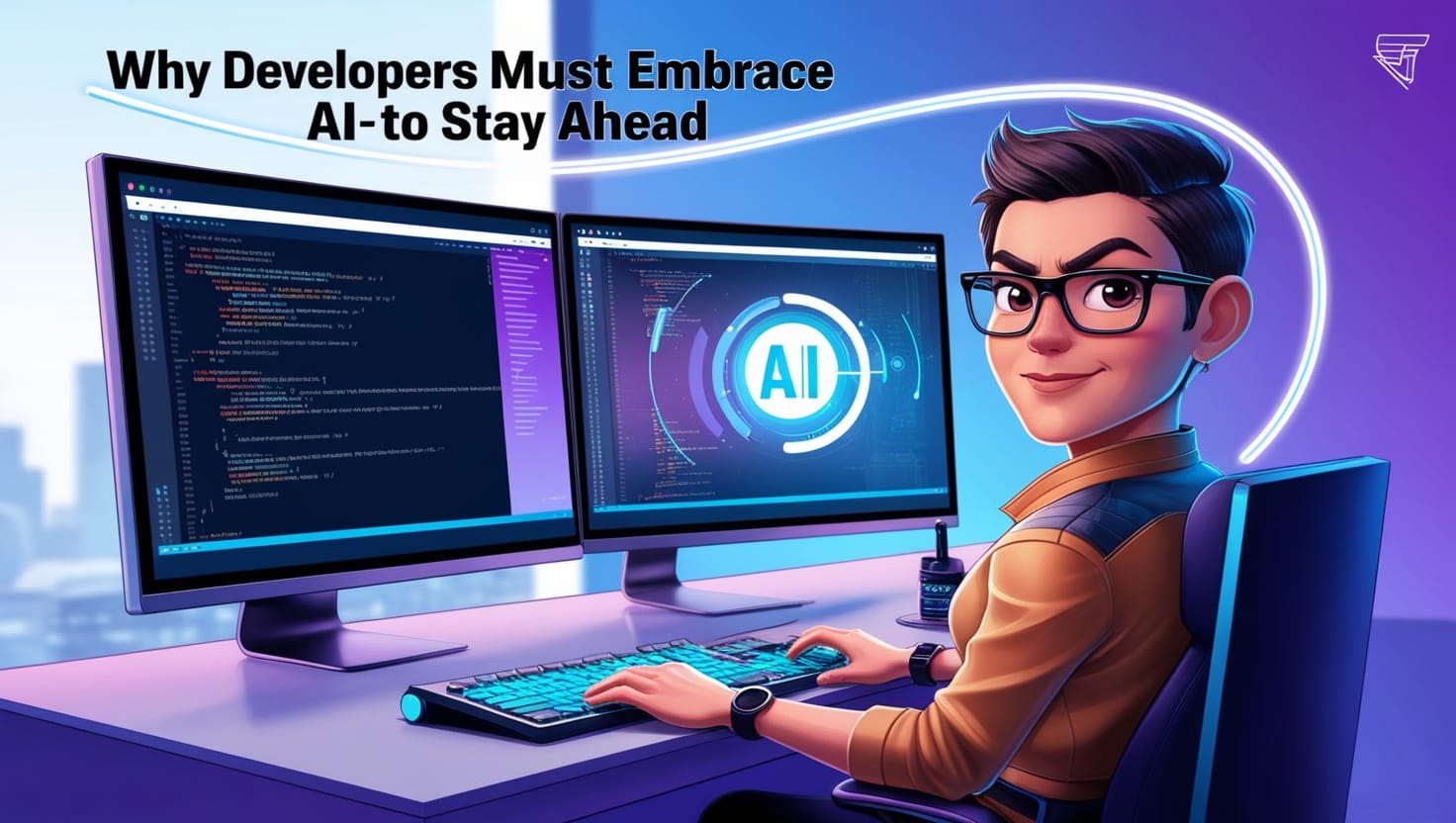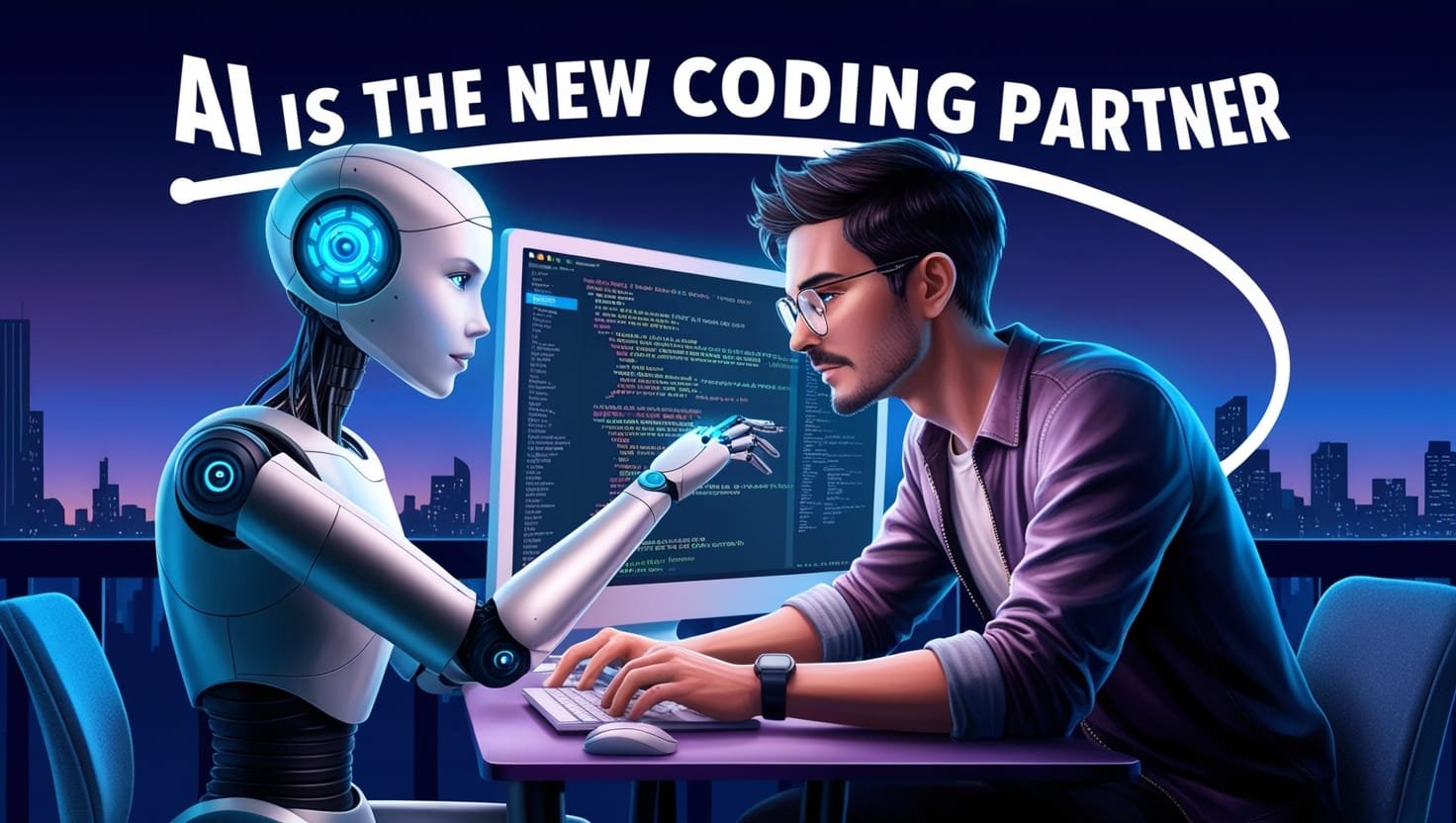AI Is the New Coding Partner – Why Developers Must Embrace It or Risk Falling Behind 🌟
In the rapidly evolving landscape of software development, artificial intelligence (AI) has emerged as a transformative force, redefining how developers approach their craft. As we navigate through 2025, AI is no longer just a supplementary tool but a vital coding partner that developers must embrace to stay ahead. This guide explores the rise of AI in coding, its benefits, real-world applications, challenges, and the data driving its adoption, providing developers with a clear roadmap to harness its potential.
The Rise of AI in Coding 🚀
The integration of AI into coding practices has accelerated dramatically, fueled by advancements in machine learning and natural language processing. According to a 2025 report by BCG, 46% of software companies are now considered AI leaders, placing the industry among the top adopters alongside fintech (49%) and banking (35%). This widespread adoption is driven by AI’s ability to perform advanced reasoning, solving complex coding problems with logical steps akin to human thought processes. Concepts like “vibe coding,” where developers guide AI at a higher level of abstraction, are gaining traction, signaling a shift toward more intuitive and efficient coding practices. By 2025, global AI users are expected to reach 378 million, a 20% increase from the previous year, underscoring the technology’s growing influence.
Benefits of Incorporating AI into Coding 💡
One of the most significant advantages of AI is the boost in productivity. A study by Goldman Sachs revealed that developers using AI tools experienced up to a 20% increase in productivity, as AI automates repetitive tasks like code completion and function generation. This allows developers to allocate more time to strategic and creative aspects of their projects. For example, tools like GitHub Copilot can suggest entire code blocks based on context, streamlining the development process and reducing manual effort.
Beyond productivity, AI significantly enhances code quality. By analyzing vast codebases, AI tools can identify potential bugs, suggest optimizations, and ensure adherence to best practices, resulting in more robust and maintainable software. This is particularly valuable in large-scale projects with multiple contributors, where maintaining consistency can be challenging. AI’s ability to detect errors early and propose improvements helps developers produce cleaner, more efficient code, reducing technical debt over time.

AI also opens new avenues for innovation in software development. By handling routine tasks, AI frees developers to experiment with novel technologies, explore creative solutions, and tackle complex challenges that were previously time-prohibitive. For instance, AI-driven tools can generate prototypes or suggest architectural improvements, enabling developers to push the boundaries of what’s possible. This shift is transforming the role of developers from mere coders to strategic innovators, a critical evolution in a competitive industry.
Real-World Case Study: zencoder.ai 🛠️
A compelling real-world example of AI’s impact on coding is zencoder.ai, a tool that automates code generation for Python microservices. In a project involving complex data processing, zencoder.ai generated a complete data pipeline in minutes, a task that would typically require hours or even days of manual coding. This not only accelerated development but also ensured the code was optimized and error-free, demonstrating AI’s ability to enhance speed, scalability, and efficiency. Such case studies highlight how AI is becoming an indispensable partner, enabling developers to deliver high-quality solutions faster than ever before.
Challenges of AI Integration ⚠️
However, integrating AI into coding practices is not without its challenges. A 2025 study by METR revealed a surprising finding: experienced open-source developers took 19% longer to complete tasks when using AI tools, contrary to their expectations of a 24% speedup. This slowdown was attributed to factors such as the time required to understand AI-generated code, debugging issues, and the learning curve associated with new tools. These findings underscore the importance of proper training and strategic integration to maximize AI’s benefits. Developers must invest time in learning how to effectively use AI tools, ensuring they complement rather than complicate their workflows.
Data Insights on AI Adoption 📊
To provide a clearer picture of AI’s impact, consider the following data on its adoption and value in software development:
| Metric | Details |
|---|---|
| AI Adoption in Software Development | 46% of software companies are AI leaders, compared to 49% in fintech and 35% in banking. |
| Value from AI | 62% of AI value in software companies comes from core business functions, with R&D contributing 13% and sales/marketing 31%. |
| Productivity Gains | Developers report up to 20% productivity increases when using AI tools, as seen in studies like Goldman Sachs. |
| Global AI Market | Projected to reach $244 billion by 2025, reflecting significant investment and growth. |
The Future of AI in Coding 🔮
As AI continues to evolve, its role in coding will only grow more significant. Developers who embrace AI as a coding partner will likely find themselves at the forefront of technological advancement, equipped to tackle complex challenges with greater efficiency and creativity. Conversely, those who resist or fail to adapt risk falling behind in an industry where speed and innovation are paramount. By understanding AI’s benefits, learning from real-world applications, and addressing its challenges, developers can position themselves to thrive in this AI-driven era.
Sources 📚
zencoder.ai Blog
METR Study
BCG AI Adoption Report
Exploding Topics AI Statistics
Frequently Asked Questions (FAQs) ❓
What is AI’s role in modern coding practices?
AI acts as a coding partner, assisting with tasks like code generation, debugging, and optimization, enhancing both productivity and code quality.
Why must developers embrace AI to stay ahead?
AI is transforming software development by offering productivity gains and enabling innovation, making it essential for developers to remain competitive.
How does AI improve code quality?
AI analyzes code to identify bugs, suggest optimizations, and ensure consistency, leading to more robust and maintainable software.
What is ‘vibe coding’ and how does it relate to AI?
Vibe coding involves guiding AI at a higher level of abstraction, enabling more intuitive and efficient coding practices.
Can you provide an example of AI in coding?
zencoder.ai automates code generation for Python microservices, significantly reducing development time and improving efficiency.
What are the productivity gains from using AI in coding?
Studies, such as one by Goldman Sachs, show up to 20% productivity increases for developers using AI tools.
Are there any challenges with using AI in coding?
Challenges include learning curves, potential slowdowns (as seen in the METR study), and the need for effective integration.
How widespread is AI adoption in software development?
46% of software companies are AI leaders, with significant adoption in fintech (49%) and banking (35%).
What percentage of AI value comes from core business functions in software companies?
62% of AI value in software companies comes from core functions, with R&D contributing 13% and sales/marketing 31%.
What is the projected size of the global AI market by 2025?
The global AI market is projected to reach $244 billion by 2025.
How can developers prepare for AI integration in their workflows?
Developers should learn AI tool capabilities, practice their use, and stay updated on industry trends.
Is AI replacing developers?
No, AI augments developers’ capabilities, allowing them to focus on complex and creative tasks.
What skills do developers need to work with AI?
Key skills include understanding machine learning basics, familiarity with AI tools, and interpreting AI-generated code.
How does AI help in debugging code?
AI identifies potential bugs by analyzing code patterns and suggests fixes, speeding up the debugging process.
Can AI be used for all programming languages?
AI tools are most advanced for languages like Python and JavaScript, but support for others is expanding.
What are some popular AI coding tools?
Popular tools include GitHub Copilot, Tabnine, and zencoder.ai for code generation and completion.
How does AI impact the software development lifecycle (SDLC)?
AI enhances every SDLC stage, from code generation and testing to deployment and maintenance.
What is the future of AI in coding?
The future involves more advanced AI handling complex tasks, potentially leading to autonomous coding in specific contexts.
How can companies encourage developers to adopt AI?
Companies can provide training, access to AI tools, and foster a culture of innovation and efficiency.
Is there a risk of over-reliance on AI in coding?
Yes, over-reliance without understanding AI-generated code can lead to maintenance and debugging challenges.
